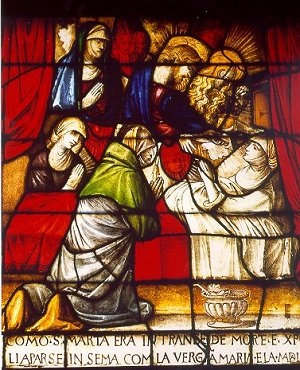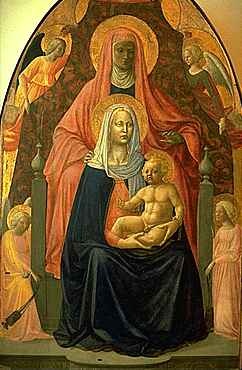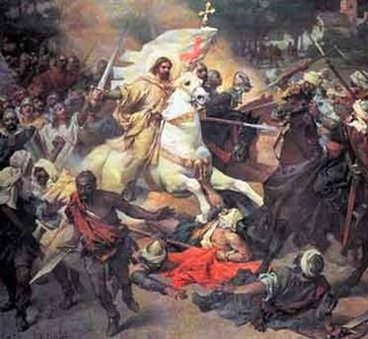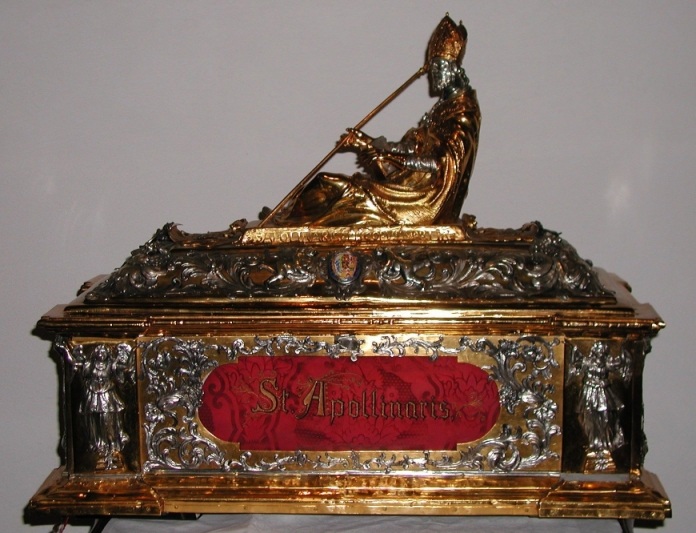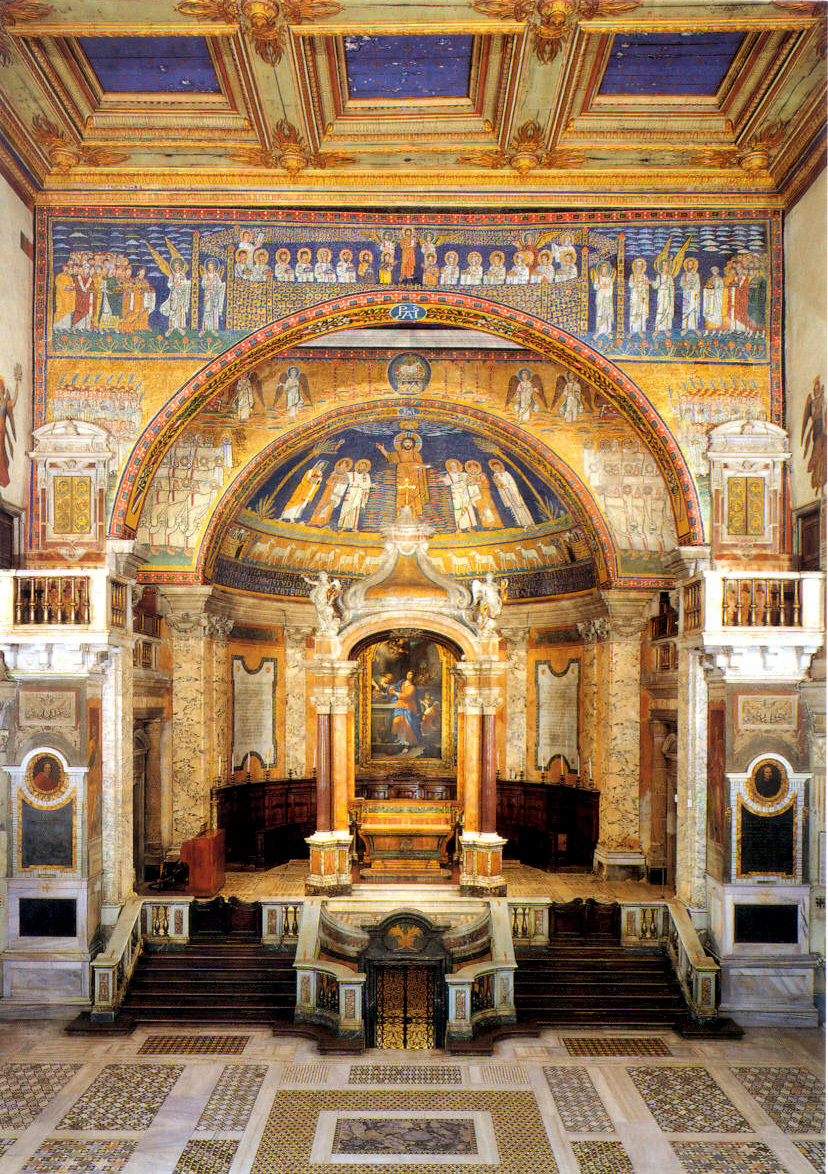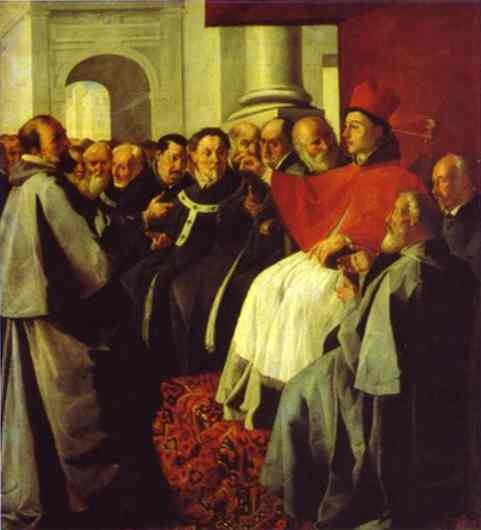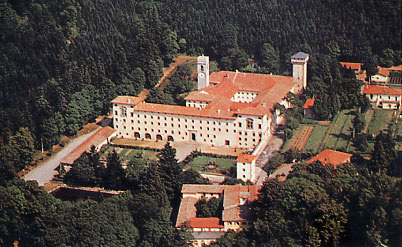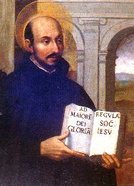
 Ignatius was a Spaniard by nation, and was born of the noble Biscayan family of Loyola. He followed first the Court and then the army of the Most Catholic King. At the siege of Pampeluna he received a severe wound which laid him up with a long and dangerous illness. During this time he chanced to read some godly books, and conceived from them a burning desire to follow in the footsteps of Christ and his Saints. He betook himself to Montserrat, and there entered himself for the heavenly warfare, by hanging up his weapons, and watching them for a night before the Altar of the Blessed Virgin. Thence he withdrew to Manresa, clad in sackcloth, for he had before given his costly raiment to a beggar. At Manresa he lived upon bread and water, begging the bread, and fasting every day except the Lord's Day.
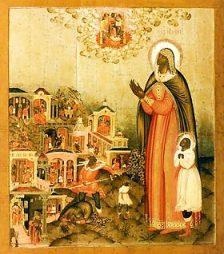 Butler's lives of the Saints St. Julitta, Martyr THE EMPEROR Dioclesian, by the first edicts which he issued out against the Christians in 303, declared them infamous, and debarred from all protection of the laws, and from all the privileges of citizens. By thus putting arms into the hands of every one against them, the tyrant hoped to see their very name extinguished; but he was not sensible that this divine religion then triumphs when its professors seem to be overcome by death, and that by it human weakness is made victorious over the power of the world and hell. Of this St. Julitta is an instance. She was a rich lady of Cæsarea, in Cappadocia, and was possessed of many farms, cattle, goods, and slaves. 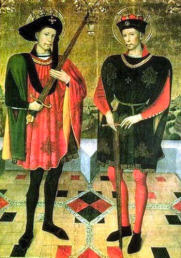 They were Persians, but coming to Rome, courageously confessed the faith of Christ in the persecution of Decius in 250. They were cruelly tormented, but the more their bodies were mangled and covered with ghastly wounds, the more were their souls adorned and beautified with divine grace, and rendered glorious in the sight of heaven. The Christians at Rome did not treat them as strangers, but as brethren united to them in the hope of the same blessed country; and after their death carefully deposited their bodies in the house of a subdeacon called Quirinus. In the reign of Constantine the Great, their relies were removed into the ancient burying place of Pontian, so called from some rich man who built it; called also, from some sign, Ad Ursum Pileatum. It afterward received its name from Saints Abdon and Sennen. It was situated near the Tiber, on the road to Porto, near the gates of Rome. The images of these martyrs with Persian bonnets and crowns on their heads and their names, are to be seen there at this day in ancient sculpture. Saints Abdon and Sennen are mentioned in the ancient Liberian Calendar. and in other Martyrologies though their modern Acts deserve no notice, as cardinal Norris has demonstrated. 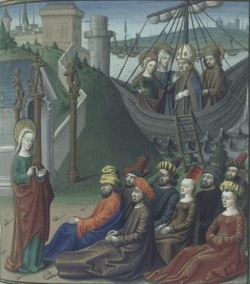 Martha was the daughter of noble and wealthy parents, but is best known as having been the hostess of the Lord Christ. After that he was ascended into heaven, Martha, along with her brother Lazarus, her sister Mary Magdalene, her waiting-woman Marcella, Maximin, who was one of the seventy-two disciples of the Lord Christ, and who had baptized the whole of the family, and many other Christians, was taken by the Jews, and turned adrift upon the open sea in a ship without sail or oars, to meet with certain wreck, but by the governance of God the ship came to land at Marseilles with all safe. Through the miracle and the preaching of the Saints, the people of Marseilles first, and then those of Aix, and of the uttermost tribes, believed in Christ, and Lazarus was made Bishop of Marseilles, and Maximin Bishop of Aix. Mary Magdalene sat still at Jesus' feet being altogether given to prayer and the contemplation of heavenly blessedness, that that good part which she had chosen might not be taken away from her, withdrew herself to a great cave in an exceeding high mountain, where she lived for thirty years, utterly cut off from all conversation with men, and every day during that time carried up by Angels into the air, to listen to them that dwell in heaven praising God. Martha, by the wondrous holiness and charity of her life, drew upon herself the love and wonder of all the inhabitants of Marseilles. She withdrew herself in company with some other honourable women into a place out of the way of men, where she lived long, with great praise for godliness and discretion. She foretold her own death long before, and at last, illustrious for miracles, passed away to be ever with the Lord, upon the 29th day of July. Her body is held in great worship at Tarascon. 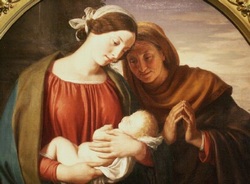 The Lesson is taken from a Sermon by St. John of Damascus The home of Anne is set before us, wherein to see an ensample both of married and of maiden life, the one in the person of the mother, the other in that of the daughter, whereof the one hath but now ceased to be barren, and the other is in a little while destined, beyond the course of nature, to become the Mother of the Messiah by a singular birth, specially designed by God to build up anew our nature. It is with reason then that Anne, filled with the Holy Ghost, with joyful and jubilant spirit singeth aloud: Rejoice with me, for out of my barren womb I have borne the bud of promise, and, as I have longed, I nourish at my breasts the fruit of benediction. I have laid aside the mournful garments of barrenness, and put on the joyful raiment of fruitfulness. Let Hannah the adversary of Peninnah make merry with me, and join with me for fellow-feeling, in singing of this new and unhoped-for wonder that is wrought in me. Let Sarah be glad that was joyfully pregnant in her old age, and was a shadow cast before of my conception that hitherto have been barren. Let all the barren and fruitless break forth into singing, when they behold in what wondrous wise I have been visited from heaven. Let all mothers likewise, that like Anne are gifted with fruitfulness, say: Blessed be he that gave their desire unto them that besought him, that gave fruitfulness unto her that was barren, and that granted unto her that from her should bud forth the joy-bringing Virgin, who, according to the flesh, was Mother of God, and whose womb was a heaven wherein he dwelt whom no place can contain. Let us also with them offer our praises to her that was called barren, but now is become the mother of a maid-child; let us say unto her in the words of Scripture: O how blessed is the house of David from whence thou art sprung, and from that womb wherein God hath fashioned the ark of his holiness, that is, her, by whom he was himself conceived without man's seed. Right blessed art thou and thrice blessed, whom God hath so blessed as to make thee to bring forth, as his own gift, the babe Mary, whose very name is highly honourable, out of whom Christ, the Flower of life, blossomed; a maiden whose rising is glorious, and whose delivery is worth more than the world. We also, O woman most blessed, do wish thee joy. In sooth thou hast brought forth what we have all hoped for, and God hath given us, namely, the babe of promise. Blessed indeed art thou, and blessed is the fruit of thy womb. The tongues of all the godly do magnify thine offspring, and every glad word is spoken concerning her of whom thou art delivered. Meet in truth is it, and most meet to praise her who received a revelation from the goodness of God, and bore for us such and so great a fruit, from whom sweet Jesus sprang. 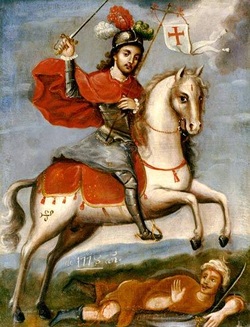 James, the Son of Zebedee and brother of the Apostle John, was a Galilean, and with his brother one of the first of his Apostles whom the Lord called, whileas they were in a ship with Zebedee their father, mending their nets―and immediately left the ship, and their father, and followed him. And he surnamed them Boanerges, which is, The sons of thunder. Peter, and James, and John, were the three Apostles whom the Saviour loved best; them he took and brought up into a high mountain apart and was transfigured before them; when he went to the house of the ruler of the synagogue to raise his daughter from the dead, he suffered no man to follow him save Peter, and James, and John; and at the last, just before the Jews took him, when he cometh unto a place called Gethsemane. After that Jesus Christ was ascended into heaven, James preached how that he was God, and led many in Judea and Samaria to the Christian Faith. A while afterward, he went to Spain, and there he brought some to Christ, of whom seven were afterwards ordained Bishops by Blessed Peter, and were the first such sent into that country. From Spain, James went back to Jerusalem, where he taught the Faith to divers persons, and, among others to the Magian Hermogenes. Thereupon Herod Agrippa, who had been raised to the kingdom under the Emperor Claudius, to curry favour with the Jews, condemned James to death for his firm confession that Jesus Christ is God. The officer who led James to the judgment-seat, at sight of the courage wherewith he was ready to offer up his testimony, declared himself also to be a Christian. As they were being hurried to execution, this man asked pardon of James, and the Apostle kissed him, saying, Peace be unto thee. James healed a paralytic, and immediately afterwards both the prisoners were beheaded. The body of the Apostle was afterwards taken to Compostela, where his grave is very famous. Multitudes of pilgrims from all parts of the earth betake themselves thither to pray, out of sheer piety or in fulfillment of vows. The birthday of James is kept by the Church upon this day, which is that of the translation of his body to Compostela. It was about Easter-time that he bare witness to Jesus Christ with his blood, at Jerusalem, being the first of the Apostles so to do. 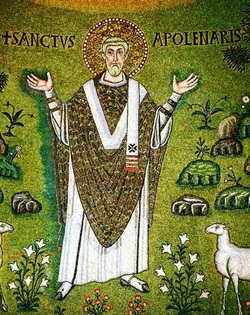 Apollinaris came from Antioch to Rome with the Prince of the Apostles, and was by him ordained a Bishop, and sent to Ravenna to preach the Gospel of the Lord Christ. He had already converted a great number of persons to the Christian Faith, when the idolatrous priests caught him and gave him a sharp flogging. A second riot was got up against him on account of one Boniface, a nobleman who had long been dumb, speaking, and his daughter being delivered from an unclean spirit. On this occasion Apollinaris was flogged again, and made to walk barefoot over hot embers. The fire did him no harm, and he was expelled from the city. Apollinaris lay hid for a while with certain Christians. Thence he went to Emília, where he restored to life the dead daughter of the Patrician Rufinus, so that the whole household of Rufinus might believe in Jesus Christ. This affair greatly incensed the Prefect, who sent for Apollinaris, and earnestly dealt with him to induce him to cease spreading the Christian Faith in that city. As Apollinaris paid no heed to the Prefect's orders, he was tortured on the rack, boiling water poured on his wounds, and his mouth bruised with a stone, after which he was ironed and cast into prison. On the fourth day he was put on board a ship and sent into banishment. The ship was wrecked, and he so came to Mysia, thence to the shores of the Danube, and afterwards into Thrace. However, the devil in the temple of Serapis declared that he could not give oracles, while the disciple of the Apostle Peter abode in these parts, and after a long search Apollinaris was found and commanded again to take ship. Thus he went back to Ravenna, where he was denounced by the same idolatrous priests as before, and given into the keeping of a centurion. This centurion was a secret worshipper of Christ, and in the night he let Apollinaris go. When it became known some of the officers of justice followed him, caught him on the road, beat him till they thought he was dead, and left him. Some Christians took him up, but on the seventh day, still exhorting them to stand firm in the Faith, he departed this life with the glorious splendour of martyrdom. His body was buried hard by the wall of the city. 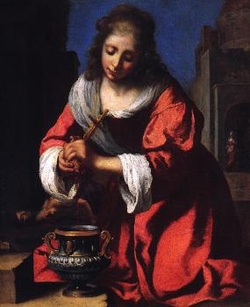 Praxedes was a maiden of Rome, and the sister of the maiden Pudentiana. When the Emperor Marcus Antoninus was hunting down the Christians, she followed them constantly with money, labour, comfort, and every helpful office of Christian charity. Some she hid in her house, some she exhorted to firmness in professing the faith, of some, she buried the bodies. For them that were in prison, and them that were toiling in slavery, she supplied every need. At last the sight of such butchery of Christians was more than she could bear, and she implored God that if it were expedient for her to die, he would release her from such suffering. And so upon the 21st day of July she was called away to receive the reward of her godly conversation in heaven. Pastor the Priest laid her body in the grave of her father and her sister Pudentiana, which was in the cemetery of Priscilla, upon the Salarian Way. 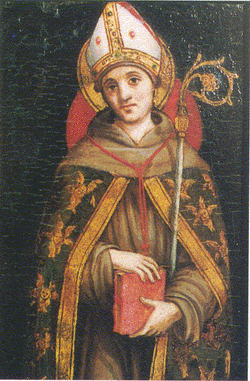 Bonaventure was born at Bagnorea in Tuscany. In his infancy he was dangerously ill, and his mother made a vow that, if he recovered, she would dedicate him to the Order of Blessed Francis. While he was still a young man he entered the Order by his own wish. Under the teaching of Alexander of Hales he advanced so quickly in learning, that in seven years he lectured publicly at Paris on the Books of the Sentences, with great applause. He afterwards explained the same Books by a brilliant Commentary. He was distinguished, not only for the profundity of his learning, but for the integrity of his morals, the innocency of his life, his humility, meekness, contempt of earthly things, and desire of heavenly treasures; and was fully worthy to be regarded as a model of perfection, and to be called a saint by blessed Thomas Aquinas, to whom he was united by ties of the closest friendship. For Thomas, finding Bonaventure engaged in writing the life of St. Francis, said: Let us permit a Saint to labour for a Saint. He was consumed with the flame of divine love, and had a special feeling of devotion to the Passion of Christ the Lord, which was the subject of constant meditation to him; and to the Virgin Mother of God, to whose service he vowed himself; and this devotion he strove also to arouse in others both by word and example, and he laboured to spread it by his writings and treatises. And so came that sweetness of manner, grace of speech, and the charity which he extended to all, by which he completely and utterly conquered every soul. Wherefore, when only thirty-five years of age he was elected, at Rome, by unanimous consent, Minister General of the Order; and having accepted the office, he fulfilled it for eighteen years with admirable prudence and the recognition of his sanctity. He made many rules, useful for regular discipline and the increase of the order; which, together with the other mendicant orders, he defended successfully against the calumnies of their enemies. He was summoned to the Council of Lyons by blessed Gregory X, and having been created Cardinal Bishop of Albano, he diligently performed a noted work for the council in very difficult circumstances; in which the dissensions of the schism were composed, and the dogmas of the Church vindicated. In the midst of these labours he died, to the great grief of all, in the fifty-third year of his age, and in the year of salvation 1274, and his funeral was honoured by the whole council and by the presence of the Roman Pontiff himself. Sixtus IV, after Bonaventure had become illustrious for many and great miracles, placed him in the list of the Saints. He wrote many books, in which the highest erudition and the fire of piety are so united as both to touch and instruct the reader. Sixtus V on this account worthily distinguished him by the name of the Seraphic Doctor. 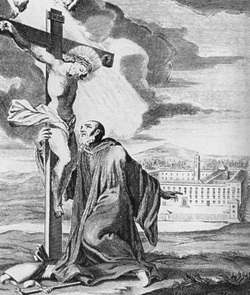 John Gualbert was the son of noble family at Florence. In accordance with the wishes of his father, he became a soldier. While he was in that profession, his only brother, Hugh, was slain by a cousin. On a certain Good Friday, John, armed and accompanied by soldiers, met the murderer, alone and defenceless, in a narrow way, where neither could turn aside. As he was at the point to kill him, the wretch fell on his knees, and stretched out his arms in the form of the Cross, adjuring him, for the sake of that sign, to forgive him; and out of reverence for the Cross he had mercy on him and spared his life. After pardoning his enemy, he went into the Church of St. Minias, which was hard by, to pray. And there he saw the image of Jesus crucified, which had that day received the worship of the faithful, bow its head to him. By this miracle John was so moved, that he laid aside soldiering, even against his father's wishes; cut off his hair with his own hands, at the Convent of St. Minias, and clad himself in the garb of a monk. In a short while he so shone with all godly and monkish graces, that he became a pattern of excellency to many. When the Abbot of that house died, the monks all chose John to succeed him. But the servant of God desired to obey, more than to command, and, being kept by God for greater things, he betook himself to one Romuald, a dweller in the hermitage of Camaldoli. Through Romuald he received a revelation from heaven, and forthwith founded an Order of his own under the Rule of St. Benedict, in the valley called Vallombrosa. Many gathered themselves to him, drawn by the fame of his holy life. Them he took for his comrades, and laboured earnestly among them to cleanse the Church in those parts from the pollution of heresy and simony, and spread abroad the Apostolic Faith. He and his had to fight with almost countless hardships. Certain enemies broke by night into the monastery of San Salvi, to destroy John and his monks, set the church on fire, pulled down the huts, and mortally wounded all the monks; but the man of God perfectly healed them all by the sign of the Cross. One of his monks named Peter also passed unhurt through a vast and raging fire. At length John and his disciples got the peace which they longed for. He purged Tuscany of the pollution of simony, and restored the faith throughout all Italy to its first purity. He entirely built several monasteries, and furnished them and others with buildings. He restored in them the strict observance of the Rule, and gave them holy laws. He sold the furniture of the Church to feed the poor, and found the very elements subject to him to bend stubborn hearts withal. He used the Cross like a sword to drive out devils. In his old age, worn out by abstinence, watching, fasts, prayers, and punishing of the flesh, his strength utterly gave way, and he often repeated the words of David: My soul thirsteth for God, for the mighty God, for the living God―when shall I come and appear before God? When he was at the point of death, he gathered his disciples together and exhorted them to love one another, and, after a little while, ordered the following words to be written down, which he wished should be buried with him: I, John, do believe and confess that Faith which the Holy Apostles preached, and which the Holy Fathers have ratified in the four Councils. At length, at Passignano, where he is held in the highest reverence, after a vision of angels which lasted three days, he passed away to be with the Lord, upon the 12th day of July, in the 78th year of his own age, and in that of salvation 1073. He is illustrious for countless miracles, and Celestine III enrolled his name among those of the Saints. |
Archives
December 2014
Categories
All
While Archbishop Lefebvre Blog is provided free of charge, there are administrative and technical costs associated with making it available to subscribers worldwide and with operating this site. Contributions to offset these costs are appreciated, and may be made via the button below
|
